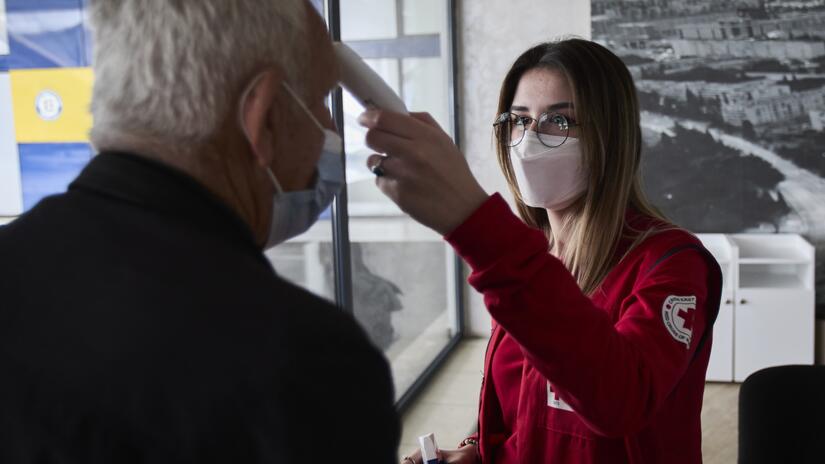Budapest/Geneva, 21 April 2020 – As Europe reaches the grim milestone of 50 million infections and 1 million lives lost to COVID-19, the International Federation of Red Cross and Red Crescent Societies (IFRC) calls for more equitable access to vaccination to counter disparities across countries and ensure no one is left behind.
More than a year into the pandemic, the situation continues to worsen despite vaccination rollout. The Europe region accounts for one third of cases and deaths worldwide, and the socio-economic crisis is deepening as newly vulnerable people seek help to meet their basic needs.
Dr Davron Mukhamadiev, IFRC Regional Health and Care Coordinator for Europe, said: “Vaccine inequity is both concerning and dangerous. COVID-19 does not stop at borders, and our safety relies on widespread immunization. However, some of the poorest countries in Europe are struggling to move forward.”
As of 6 April[1], just 12.3 per cent of the population in Europe had received at least one dose of a COVID-19 vaccine, and the lack of equitable access to immunization is still worrying: in low income countries such as Kyrgyzstan, Ukraine and the Republic of Moldova, only 0.4 per cent of total inhabitants had been vaccinated, on average, while in the richest countries that figure stood at 17.7 per cent.
The IFRC is seeking funding for its immunization plan, targeting 500 million of the most vulnerable people around the world, as part of the organization's emergency appeal to tackle the COVID-19 pandemic. Unfortunately, at present this is only 51 per cent covered. Without more funding, IFRC will be unable to make a meaningful difference for those in need.
Dr Mukhamadiev said it is crucial for governments to step up their commitments towards ensuring that everyone has equal and timely access to the vaccine.
“Equity is both a moral and public health imperative. None of us is safe, until we are all safe. At the national level, it is essential to guarantee that homeless, migrants – irrespective of their status – and other vulnerable groups are included in vaccination plans.”
Hopes of Europe returning to normality are fading, as health systems in many countries continue to be overburdened and intensive care units reach a critical point.
“Worryingly, National Red Cross and Red Crescent Societies across Europe are still witnessing the far-reaching impacts of the pandemic every day, everywhere,” warned Dr Mukhamadiev.
“Volunteers who run ambulance services or support nursing homes and hospitals are directly confronted with illness and death, while those providing other types of assistance now deal with increased human suffering and people in need, including the newly vulnerable: including those who have lost their jobs and can’t make ends meet and those who cannot deal with difficulties such as isolation,” he said.
In Spain, for example, 52 per cent of the people who asked for psychosocial support through the Spanish Red Cross’ ‘Cruz Roja Te Escucha’ service in the last months had never sought help from the organization before. Two thirds of the total reported having emotional distress most or all the time – including depression and anxiety.
Dr Mukhamadiev said the key to successfully combatting successive waves of COVID-19 is vaccination and testing, together with improved treatments and preventative measures. People should continue to routinely wear masks, wash hands and keep physical distance, as those measures play a major role in mitigating the spread of the virus.
Note to editors:
National Red Cross and Red Crescent Societies in Europe have reached nearly 100 million people with health and hygiene promotion activities since the beginning of the pandemic. They have also provided food and other material aid to more than 14.4 million, cash or voucher assistance to 2.9 million, and psychosocial support to 1.8 million.
Local teams are working tirelessly to help the most vulnerable, and continue stepping up vaccination, testing and awareness-raising interventions. Here are some examples:
- In Spain, staff and volunteers have assisted more than 3.5 million people through the ‘Cruz Roja Responde’ multisectoral plan, which includes emergency services and the set-up of temporary hospitals and shelters together with other types of support; they are also testing migrants rescued from the sea, and supporting vaccination in nursing homes and for persons with disabilities.
- In Italy, staff and volunteers are running one of the largest vaccination centres in the country, in Rome’s Fiumicino airport. Furthermore, volunteers are sharing information on a web radio station run by young migrants, and running podcasts on COVID-19; they are translating materials into migrants’ own languages, and circulating them in reception centres while operating a toll-free 24/7 hotline.
- In Greece, staff and volunteers in the islands, Athens and Thessaloniki are giving a hand with the health screening for migrants, they are responding to thousands of daily calls to their multi-language hotline, and they are disseminating preventative messaging. They have also supported the routine vaccination of migrants, and stand ready to assist in COVID-19 immunization.
- In Serbia, staff and volunteers are involved in the nation-wide vaccination campaign against COVID-19 and have assisted some 447,750 people – from phone calls for vaccination appointments to distributing leaflets, transporting vulnerable people, helping at the immunization points with temperature checks and paperwork – and, in some places, organizing vaccination in Red Cross premises.
- National Societies in seven countries (Austria, Germany, Greece, Italy, Malta, Portugal and Spain) are additionally scaling up COVID-19 testing thanks to a €35.5 million partnership with the European Commission.
[1] Data from the World Health Organization (WHO)

